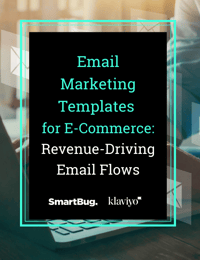-1-1.jpeg?width=1180&name=05062022_%20How%20to%20Sell%20Your%20E-Commerce%20Business%20for%203-10x%20the%20Profit%20(1)-1-1.jpeg)
How to Sell Your E-Commerce Business for 3-10x the Profit
May 19, 2022
By Matt Burda
It doesn’t matter why you’re selling your business; what does matter is its visible value to possible buyers. It’s up to you to create and provide that value.
Like buying or selling a home, there are certain things both parties take into consideration before making—or accepting—an offer. Is the foundation solid? Is it going to appreciate in value over time? How much do I have to put into this from the get-go?
A strong marketing strategy and structure that is already in place will set you up for success when you sell your e-commerce business. Once that’s solidified, there are some steps to go through to maximize your profit.
Audit Your Marketing Strategy
If there are any improvements you’ve been considering making, now’s the time. For example, getting the most out of your existing customer base by implementing top SMS marketing strategies will immediately increase the valuation of your e-commerce business.
Rather than going after new leads, recognize the value that your existing customer base can create. You already have an existing customer base, so use them. Give them a reason to sign up for SMS, like a $10 off coupon, and watch conversion skyrocket. Repeat customers are some of the most valuable as well; they generate new leads for you when they bring their friends and talk about your product.
Consider your existing email list. If you have a list of 50,000 people and only 1 percent of them open any campaigns you send, that’s also a red flag. Is your email marketing strategy on point, or do you need to revamp it now in order to maximize profit when you sell?
Continue Marketing Maintenance
Once you’ve decided to sell, it’s important to remember that the sale won’t happen overnight. While you pursue the steps of selling your business, continue to reinforce and grow your e-commerce strategy and continue to generate revenue. If your revenue starts to drop after you list your e-commerce business for sale, that may be a huge concern to prospective buyers. Are you selling because revenue is dropping?
Upkeep—or improved marketing strategy—is as important as ever in this stage. If your email marketing isn’t converting, it may be vital to take a step back and reevaluate your practices before selling your business.
Gather Analytics
Presentable, digestible data is a must if you’re wondering how to sell your e-commerce business for a profit. Presenting the perfect marketing analytics stack to a prospective buyer will increase the likelihood of closing the deal, and at a much higher rate. From existing SEO strategies that drive traffic to an in-depth view of your click-through rate (CTR), a solid analytics strategy will paint a clear picture of your success. The more, the better—more compiled data means fewer questions.
Provide Accurate, Transparent Valuation
The more information you have about your existing inventory along with projected sales, marketing strategies, and conversion, the better case you’ll have for higher valuation before you even attempt to sell. This also includes financial documentation such as:
- Tax statements (at least three years)
- Income statements
- Balance sheets
That’s only to name a few, because more is certainly better in this situation.
If you can build a positive image with full transparency, the folks interested in your business will feel more confident in their own ability to navigate their next steps, should they choose to take over. By providing records of historical earnings along with accurate representations of traffic and conversion as outlined above, you’re showing the potential of an investment rather than a fixer-upper.
You can’t come up with the value of your business on your own, though; you run the risk of listing it far too low and missing potential earnings or listing it too high and missing out on any earnings at all.
A third-party appraiser is a good approach here. They’ll look at a variety of factors including traffic, existing inventory, patents, trademarks, customer service, marketing strategies, and more. The goal of valuation is to deliver an accurate understanding of the market value of your business as it currently stands, at a number that is profitable to you and reasonable to your buyer.
Get a Broker
Working with a broker can help speed up and facilitate the sale of your business. A lot of brokers have valuation tools baked into their processes, as well. With an existing roster of potential buyers, a broker can significantly cut down on the work you personally have to do.
A broker can not only act as a negotiator and intermediary when you’re vetting buyers but can also help facilitate a speedier sale at a higher price. We cannot stress enough how valuable a broker’s access to an existing list of investors can be: They have immediate access to people who are in the business of buying e-commerce businesses. You won’t have to go out and search for yourself.
If you opt for a brokerage marketplace instead, just be aware that you’ll have to find a buyer yourself. It’ll be less expensive than a broker, but it doesn’t provide you with the protection, insight, and expertise that a broker has.
Find Your Buyer and Complete the Sale
This part of the process requires stamina and fortitude. It’s important to field multiple offers and ensure that each buyer is prequalified to complete the transaction. As noted above, a broker is an incredible asset to have through this piece.
Once you’ve accepted an offer, it’s time for a lawyer to get involved. Not only will a contract lawyer protect you from liability after the sale, but they’ll also make sure you’re protected through the process as well.
Transfer Ownership
Once you’ve completed your sale, the next step is to transition assets. Brokers often have teams that assist with transferring assets over to the new owner, so that’s something to consider as well. Depending on your contract with the buyer, you’ll more than likely stick around for a bit to help them get acclimated to your operating procedures. Working that into your contract in the first place may make your sale more appealing, too.
Most major e-commerce platforms are transferable, so if you’re already on Shopify or WooCommerce it should be pretty straightforward, but every business has its differences.
Want to Know More About How to Sell Your E-Commerce Business? Get Started with the Experts
Rest assured, you’ll be able to find plenty of help and guidance in selling your e-commerce business. The most important thing that you need to focus on before putting your business up for sale is this: Make sure you have an existing marketing strategy that already demonstrates ROI. Remember to make the most out of your existing customer list and download our Email Marketing Templates for E-Commerce e-book, and update your strategy to reflect current best practices. With preparation, focus, and the right broker, you’ll be able to sell your e-commerce business for maximum profit.

About the author
Matt Burda was formerly a Copywriter based out of Portland, Oregon. With over six years of experience in content creation, he enjoys writing copy that explores the connection between brands and people. In his spare time you’ll find him playing with motorcycles, reading, and trying to not move when his cat falls asleep in his lap. Read more articles by Matt Burda.








